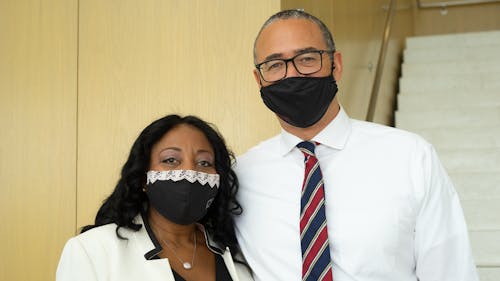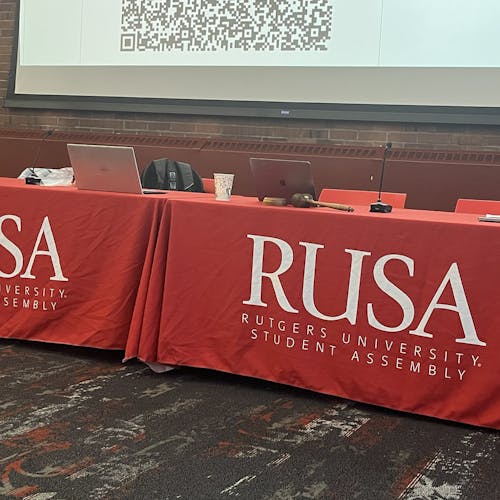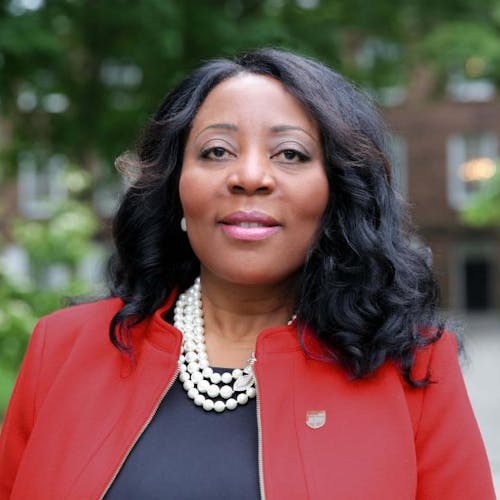Exclusive interview: Holloway, Conway talk ongoing return to campus, Rutgers Athletics, pay equity

University President Jonathan Holloway and Rutgers—New Brunswick Chancellor-Provost Francine Conway shared comments and updates on topics such as University operations, coronavirus disease (COVID-19) testing for vaccinated students, Rutgers Athletics finances and ongoing pay equity issues in an interview with The Daily Targum.
They first discussed the progress of the current semester as well as some upcoming plans for the Spring 2022 semester.
Holloway and Conway said the return to campus and in-person instruction has been both positive and exciting so far, with the Rutgers community largely following all COVID-19 safety protocols, helping to create a smooth transition.
While most undergraduate courses are currently operating online, Conway said it is expected that classes will largely return to as they were before the pandemic for the spring semester. She said that approximately 10 percent of courses were online before the pandemic and that approximately 10 to 15 percent of courses are expected to be online this spring.
Another topic discussed by Holloway and Conway dealt with COVID-19 testing at the University, specifically for individuals who are fully vaccinated.
Holloway said the reason why tests are not readily available for all students despite vaccination status is due to the nature of the delta variant and the way in which students live on campus. He said this decision follows advice provided by Brian L. Strom, chancellor for Rutgers Biomedical and Health Sciences, and Antonio M. Calcado, executive vice president for strategic planning and operations.
“Testing really only makes sense for those who are not vaccinated or who we know are exposed,” he said. “By the way the delta (variant) operates by the time you tested, in most cases it's already done its work because it's so highly contagious. This is why vaccination is so so critical.”
Holloway said the routine surveillance testing for those who are vaccinated that some individuals are calling for can provide a false sense of security and would not actually help from a diagnostic, epidemiological standpoint. For these reasons, he said the University has no plans to implement a testing program of this sort for fully vaccinated individuals.
Though, he said the University does have a contact tracing program that will bring people in for testing if Rutgers learns they have been exposed to an individual who has tested positive.
“Students who are vaccinated are provided University testing if they are a close contact of an infected individual, or if they have possible COVID-19 symptoms. Student Health will provide instruction on how to receive a test,” said University spokesperson Dory Devlin. “All students currently registered for classes (with the exception of fully online degree-granting program classes and continuing education classes) are eligible to use Rutgers Student Health.”
Holloway said a current challenge the University faces in regards to COVID-19 testing is if individuals get tested outside of Rutgers, such as if they go home for the weekend or get an at-home testing kit, and do not report the results. He said that if any individual tests positive, they should report it to the University so proper action can be taken from there.
Regarding the Targum’s findings on the University’s distribution of federal student aid during the pandemic, Holloway said the contradictions in Rutgers reports of this distribution came from certain funds having to be reclassified. He said the University is required to gather data on financial need among its students before granting the federal aid but is ready to distribute a large amount of it soon.
In regard to Athletics, he said the way that some individuals have referred to Rutgers Athletics’ spendings as “internal loans” has negatively affected discussions about the program’s budget, when he views this spending as a capital investment that is high-risk and high-reward.
“That brings a whole different perspective because there are very few places at universities that are revenue-positive,” Holloway said. “Business schools are revenue-positive. Medical centers, most times, are revenue-positive. Athletics, no matter where you are in the country, (are) almost never revenue-positive, but they represent an investment of a different type.”
Though, he said Athletics has seen a substantial increase in revenue from last year with increased attendance at stadiums and merchandise sales.
In the meantime, he said Athletics has accounted for below 3 percent of the University’s budget through the pandemic. He said the increase in the program’s budget is not responsible for the downsizing of other budgets in the University and that some of the purchases in the program have been taken out of context.
Holloway said the Athletics program’s budget and the academic budget cannot be compared in that Rutgers coaches, unlike tenure-track faculty, receive compensation through contractual agreements and can quickly be recruited to coach elsewhere, requiring that the University secure them through such contracts.
“There’s a night and day difference coming in the next budget,” Holloway said. “I get the optics — they’re horrible. And I’m not happy about them either … especially when you think about (COVID-19). But I’m certain we’re going to get to a better place. It may take a couple years, but I’m certain we’ll get to a better place.”
While faculty have been required to receive chancellor approval for spending as little as a few hundred dollars from funds in their budgets, Conway said the University has allowed research faculty access to a credit card, with a person from each school assigned to oversee purchases. She said the University has developed a faculty advisory council to facilitate communication within smaller units and help ensure all faculty are having their needs met.
Holloway further discussed recent issues regarding pay equity and intercampus equity at the University, first talking about the initial round of pay equity letters sent out to those who applied for adjustments.
He said he was told since February that the University was getting close to being able to release the letters, and when it was taking longer than expected, he ultimately decided to take a measured risk by sending out the letters for legal reasons. Another reason he said it had to be done was so it could serve as an indication that the administration is trying its best.
Holloway said that while some individuals agreed with their adjustments, others felt differently, specifically Camden faculty who were disproportionately displeased with the pay equity situation in the first place and the results of the letters.
He said the decisions are currently being reviewed and that the process will continue to play out as the appeals phase begins. By the end of this process, he said they will end with a set of decisions that look different from the initial letters in some ways, but he cannot predict specifics of the process or the outcome at this time.
“We all think that the process needs to be refined and improved, and so I'm hoping that once we get to the other side of these appeals, we'll be in a better place,” Holloway said. “We'll be in a place where we can actually have a much more reasonable process. Right now, it's very messy and a challenge.”
Yesterday, Holloway participated in a town hall event at Rutgers—Camden, in which he discussed the ongoing pay equity issue, among other topics. He said this was his first time discussing the issue with faculty following the concerns brought forward at the recent Board of Governors meeting.
Holloway said the conversation with union leadership regarding pay equity and intercampus equity is ongoing. He said he has been as transparent as he can be in terms of the process going forward to resolve these issues, stating that pending legal matters have made it difficult to discuss the matter fully.
In order to increase efficiency and communication between unions and the University, he recently announced the creation of an Office of University Labor Relations, which he said is now up and running.
Next week, Holloway said there is going to be a retreat of this office leadership, where multiple union leaders will be invited to speak to the office to gain a better understanding of how it will operate.
Due to the important role that the unions play at the University, this office will report directly to his own office, which he said is significant, as there are not many offices that report to him directly.
“'I’m trying to signal … hopefully a new way forward, trying to underscore the importance of labor to the success of the daily operating of the University and also trying to be more coordinated and timely in how we respond to any kind of union queries or advancing union contracts,” he said.



